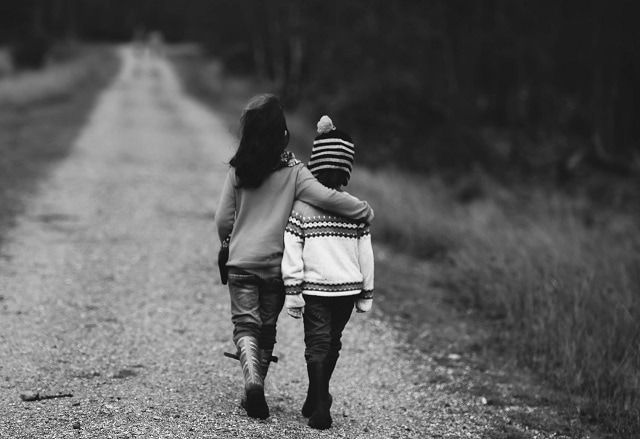But uncomfortable doesn’t mean comfortless.

Perhaps you’ve worked hard all your life to get where you are, and you feel you deserve to be comfortable now. Perhaps you’ve never known anything different. Or maybe you feel like you’ve struggled all your life and haven’t a thing to show for it but more work ahead. But there is a difference between being comfortable and being comforted.
Being comfortable typically means living a life without anxiety or discomfort, and often assumes an appropriate financial status to afford a standard of living one is satisfied with. In the U.S. we often talk about it as “living the American Dream.” We also use the term to describe someone who is self-assured, as someone “comfortable in their own skin.”
Regardless of where we are on the socio-economic spectrum, we can be comfortable with where we are. I have family who are fine with working just long enough to buy their cigarettes and booze or drugs, and only try harder if they want to, say, get the car running. I have others in my circle who followed the prescribed schedule of college, career, marriage, and a comfortable retirement. And many variations in between.
Suddenly, we have all had our comfort zones burst by a one-two punch with COVID-19 and the death of George Floyd.
In the first instance, we discovered that pandemics don’t care about income, pedigree, or even righteousness. We’ve been reminded that death is the great equalizer no matter how many euphemisms we might try to hide behind. Sure, some areas and groups have been hit harder than others, but none of us are immune. And that has brought fear to many who have been insulated from the uglier aspects of life.
In the second instance, we’ve had some harsh realities thrown in our faces: there is police brutality in many of our communities (by no means all) and much of it is race driven. Yes, there are people who will take advantage of a protest to riot and loot, some with their own political agendas and some because they’re selfish idiots, but most of the protests have been peaceful. And yes, some of our leaders prefer to advance their personal agendas at the expense of their electorate, while most are trying hard to find peaceable and workable solutions to the issues in question.
Whether a shopkeeper is anxious about being closed because of the virus or because of a looting, her comfort bubble is burst. Whether you’re washing tear gas out of your eyes or shaking your head at the latest pictures on TV, you’re probably feeling uncomfortable.
This is good. Feeling uncomfortable with a situation can force you to think, and thinking can lead to change, and change can lead to action. This is how we stretch and grow. Or you can choose to wall your self away from the discomfort, stagnate in your quiet pond, and decay from the inside out.
I heard a great analogy the other day:
A feast was being held in a village. Friends, neighbors and strangers alike were invited and seated at a large table. Food began to be served, one course at a time. Everyone was given a bowl of soup, and the conversation became animated as people exclaimed over the flavor. Except for one man in the middle of the left side, who had been working in the fields all day. He looked around as everyone slurped their soup, and waited to be served. And waited.
Soon the soup bowls were whisked away, replaced by salad plates. Once again, the table before him was left empty, and his stomach growled. The woman on his right closed her eyes and moaned, “This dressing is to die for! Just wait until you taste it.” The man on his left saw the field worker’s hungry gaze when a server placed one of the first platters of roast beef before him. “You’ll get yours soon enough,” he said, as he cradled his right arm around the dish defensively. The hungry man tried to catch the eye of a server, but they all ignored him as they progressed around the table before disappearing into the kitchen again.
Finally he stood up and said with a loud voice, “Don’t I get to eat, too?”
How would you feel if you were that man? If you were another guest? If you were the host?
I’d love to change the narrative of the story and say a little cherub of a girl walked her plate over to the man and said, “Here, you can have mine.” But life isn’t a Hallmark moment. The man is still standing in his hunger and pain, and most of us are still trying to figure out what to do.
We’ve reached a point in our society where we need to be rocked out of our complacency, out of our comfortable lives, and see those around us who aren’t getting fed, whether physically, mentally or spiritually.
And it’s uncomfortable.
I’m not going to tell you what to do. That is not my place, nor for me to decide.
And that’s uncomfortable.

Each step we take from this point forward can be blind and reactionary, or thought out and with purpose. There will be mistakes, trips, even falls. There will be resistance from without, but mostly from within. Already people are trying to tell you what to do and what not to do. It’s confusing. It’s annoying. It hurts.
And that, too, is uncomfortable.
What I can suggest are some questions to evaluate what those voices say:
- Is it constructive or destructive?
- Does it divide or unite?
- Does it speak justice for all or only for some?
- Does it move me out of my comfort zone? (That is usually a good thing. What we fear most is what we usually need to face most.)
- Does it bring grace and comfort to those who need it? (Yeah, that’s all of us, but some are hurting more right now.)
“Wait! If we’re not supposed to be comfortable, where does comfort come in?”
I didn’t exactly say that we can’t be comfortable. Everyone deserves a rest once in a while, and nothing says it has to be on a bed of nails or granite rock. It’s when we stay in that comfort bubble that we risk stagnation.
But even if we’re not on a conscious journey to grow, Life throws stuff at us all the time: loss, death, change, hardship, harsh events that seem (and maybe are) meaningless. That’s when we need to be comforted. And having walked through those moments with awareness, we are then able to comfort those around us.
For some reason, we think that words are the best way to comfort. But having lost parents, a nephew, relationships, and dreams, I would say words are overrated. (Yes, this is from a writer!) When confronted with someone’s pain, we often feel bereft of the right words, because words aren’t always the best comfort. A listening ear, a hug, a warm blanket, a good meal, a silent presence in solidarity (even at 6 ft. away) are so much more effective. Even a shared sunset and laugh (or tears) can soothe more than words.
“But,” some might ask, “what about Scripture? What’s wrong with sharing God’s promises?”
Absolutely nothing is wrong with taking comfort from Scriptures, or from poems and writings and music and other arts that touch the heart and soul. But our society in general and western culture, particularly, has wielded the Bible and it’s contents more like sandpaper and salt instead of silk and balm.
We tend to use the Bible and religious words to condemn and shame instead of sooth and strengthen. We’ve used them to set up roadblocks and tests, instead of opening gates and welcoming any requiring rest and refreshment. We’ve used them to deny service at God’s table, finding excuse after excuse. I’m keenly sensitive to this, as I was on the receiving end of such abuse.
There was a time when I couldn’t open a Bible, for all the fear and hurt it represented. A friend said, “Well, if you’d just read your Bible and go to church instead of seeing a counselor, you wouldn’t have all these problems.” She had no idea how much I talked to God during every day, or how much I agonized over my struggles with the people in my church.
Instead, I was introduced to healing words from contemporary writers and other traditions like Buddhism, and Taoism, and even philosophers. Through music and poems that bypassed my hurt to speak to my soul. In my case, those quotes and sayings and songs that were the most comforting had their representation in the Bible, too. I’d find myself saying, “That’s just like what Jeremiah said,” or “That’s what John was getting at in chapter 8,” and so forth. I needed a bypass of the damaged arteries to be able to receive the life-giving blood.
There are things we all encounter and need as humans, and those Truths are universal.
There is Pain, and it needs Healing. There is Loss and it needs Comfort. There is Oppression that needs Justice. And there are Shame, and Despair, and Loneliness that need Grace, and Hope, and Love.
No, Life isn’t comfortable. But it’s not without comfort. And sometimes the most powerful gift we can give is to really look at those seated at the table around us and ensure everyone has a chance at the mashed potatoes and gravy, or the barbecued ribs, and even the banana pudding. And pull them into the conversation with laughter, and smiles, and listening ears. Comfort.

Grace, Peace and Hugs to you.